Posted by Louis Dubreuil on 09-08-2004 07:56 AM:
TWO BAGS
Here are two bags I suppose to be anatolian (if somebody could confirm or
infirm this). Those two bags are utilitarian weavings made for storing or
transporting goods or objects (woven objects for ex.). The technic is weft faced
plain weave plus decorated motives executed with the soumak technic. In the two
bags warps are made of a coarse thread, natural, without dying that seems to be
camel hair (I am not sure of this). Colours : blue, pinks, brown, pale red. May
be madder dyes because there is no running of the reds. The whites are coton
made.
The two bags share the same motive. This motive is well spread in
diferent weaving areas, from the caucasus to the baluch territories. I do not
know the name of this motive and I am looking for informations about it. I would
prepare a salon about it.
For me the appreciation of those two bags is
the folowing :
The first one,
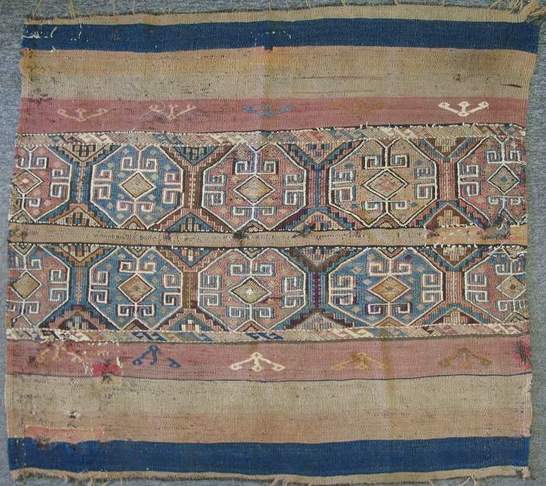
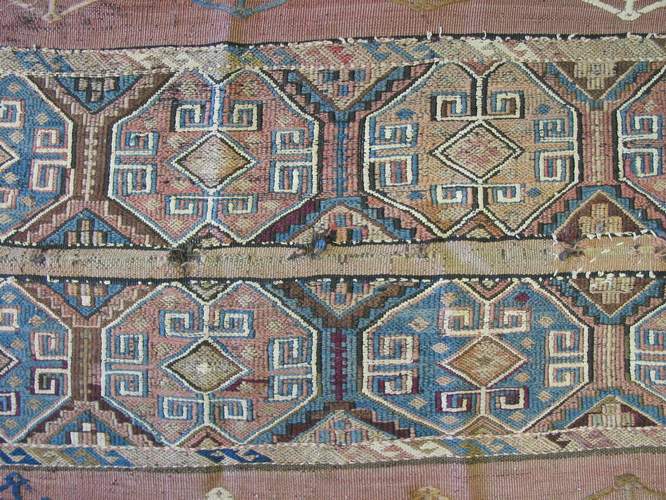
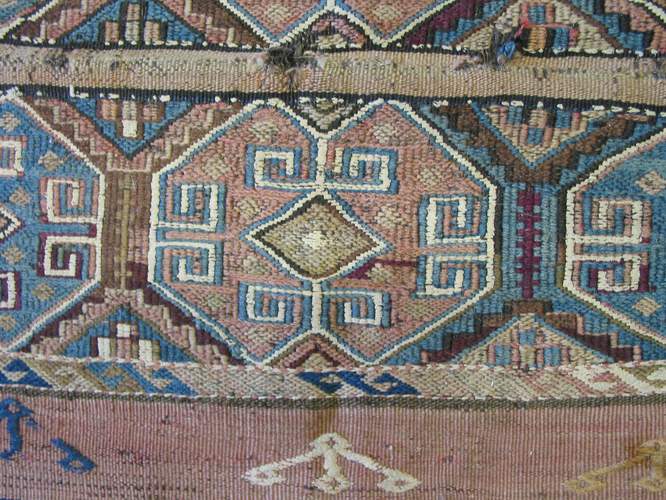
despite its coarser
weaving and its poor aspect is better drawn than the second. in this first bag
we can see a better feeling of the weaver for the motive than in the
second.
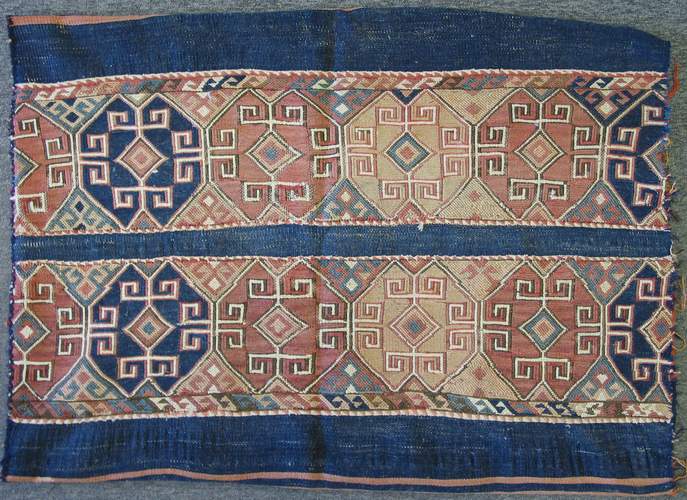
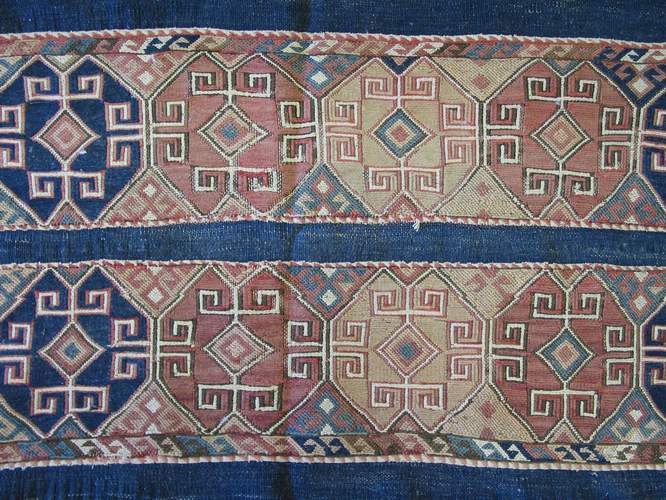
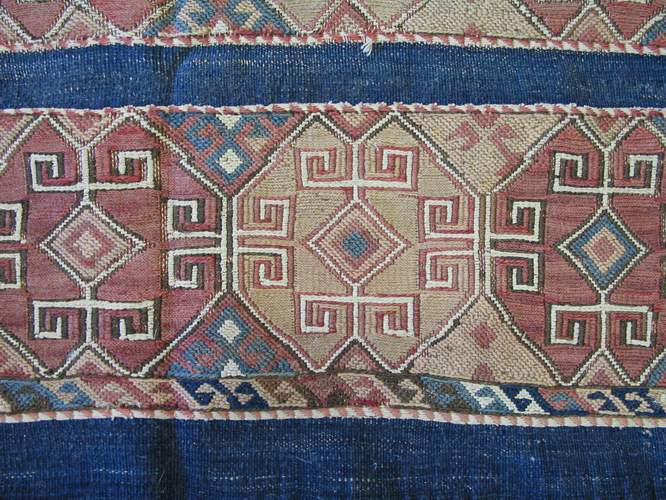
In this latter the design is finer and better done than in
the first but I do not feel the same "soul" in it. The drawing seems to me more
shabby, more skimpy, without the dynamic of the first one. The lack of
separation between the motives is also certainly responsible of a certain lack
of space and produce a crowdy effect.
The blue ground is also directly
connected to the "guls" (they are also more compact, more rounded in shape),
that increase the lack of space around the decorative motives.
I suppose
the first one is older than the second, this could explain the difference in the
"soul" of the design.
I let them to the appreciation of the Turkotek
community.
Meilleures salutations à tous
Louis Dubreuil
Posted by Filiberto Boncompagni on 09-08-2004 11:42 AM:
Hi Louis,
The technique seemed more brocaded, not soumak…
So I
looked around and I found this on my HD.
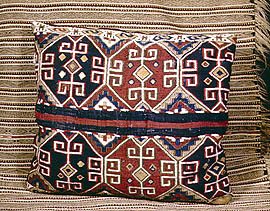
It was on Marla Mallett’s website
a few years ago. Marla’s description was:
Malatya brocade pillow
Eastern
Turkey. Wool, with white cotton
Regards,
Filiberto
Posted by Richard_Farber on 09-10-2004 09:13 AM:
Dear Mr. Louis Dubreuil,
from the images of the two pieces i am not at
all sure that the first is older than the second. very often pieces with good
natural dyes look "fresher" than pieces made with poor quality synthetic
dyes.
sincerely
richard farber
Posted by Louis Dubreuil on 09-13-2004 01:49 PM:
Bonjour à tous
I have got a very little succes with my two bags. 148
viewers but very few comments.
Maybe the design is too poor for getting the
attention of "rugologists".
If I have any interest in those bags in
particular and in this type of object in general, it is for two reasons.
First I find wonderful that for a daily use as banal as transporting straw
or grain or cloth, peoples take the pain to make the effort of making those bags
with a lot of taste and soul. But when we think to the signification of the food
or of the clothing in traditionnal societies it becomes normal that all the
things that participate to the food and clothing production could be made by a
process that includes over-functional meanings as apotropaïc or protective or
symbolic drawings. Our societies have (apparently) lost thoses practices (but we
can question us about the incredible importance of "trade marks" in the
customers' habits). The ethnical dimension is a part of my interest in thoses
weavings, and I think that functional objects can be more "genuine" and no
polluted by commercial practices. This is certainly why I prefere the first bag
that has obviously been (hardly) used and just made for this use, to the second,
that is quite new and unsused and that can be supposed to have been made just
for trade.
The second reason, and I have made an allusion about that in
my first post, is the design used. As "rugologists" each of us know the name of
well known and well studied motives as "memling gul", "tauk nuska gul",
"tchemtche gul" and so on. But there are numerous other motives that have not
any name for calling them or talking about them. The motive used in those bags
is apparently one of those "without name " motives. But it is not the "without
name motive" I talk about in a past salon about berber rugs. This octogonal
shape with inward oriented square hooks (I would prefer just one word to call it
!) is found from the Anatolia (in the west) to the balluch territories (in the
east), with many exemples between these two ends (Caucasus, Talish, Shirvan,
Luristan...). Meanwhile it is unknown in the turkmen vocabulary. That is for me
a great mystery. I think it would be a good subject for a collective research in
order to make a salon "à plusieurs voix" on this subject.
Voilà, c'est
tout pour ce soir.
Amicalement
Louis






